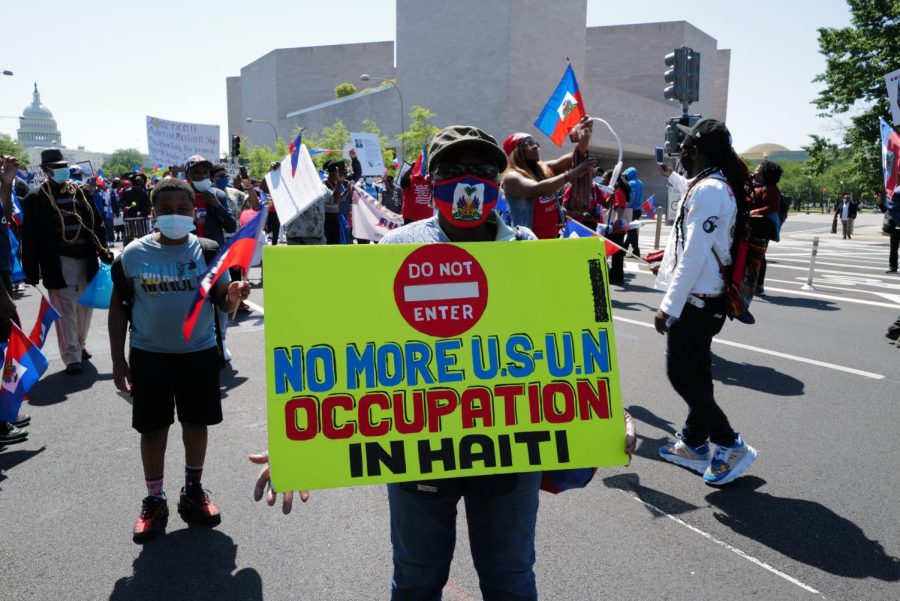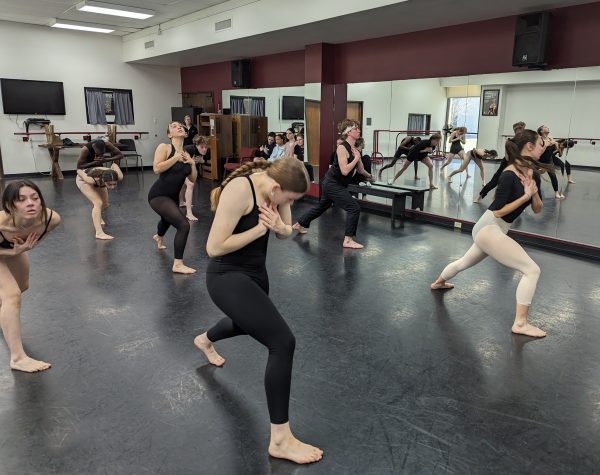US chooses to interfere in Haiti, again
Washington, DC – May 18, 2021: Demonstrators marching along Pennsylvania Avenue to the White House to encourage the Biden administration in ending its support of Haitian President Jovenel Moise.
Haiti, the country that holds the world’s only successful slave-revolt, has been the target of colonial and exploitative powers since its inception. Haiti’s president, Jovenel Moïse, was assassinated by a group of Columbians that have historically been American-funded, in 2021, and there has been a power vacuum in the state since.
However, this is not the first, or likely last time, a leader of Haiti was assassinated. Following a 1915 presidential assassination, American forces invaded the Black republic for 19 years. Then, the U.S. intervened in 1994 to attempt to restore the democratic wishes of the Haitian people and their government. However, the majority of time another state gets involved in Haiti; it is against the people’s wishes.
For the most recent example of instability, the de-facto prime minister and acting President Ariel Henry has called on the international community to help the country restore order. The sending of police forces and equipment to be used by the state against the people of Haiti, is not what Haitians want.
“Haiti is not one of the epitomes of American assistance,” said Dr. David Rausch, Teel Bivins professor of political science. “In many cases, the help doesn’t get to where it needs to go.”
The biggest advocates of international intervention in Haiti are the people with the most influence, the wealthy and powerful. Whenever outside forces come onto the island of Hispaniola, there is not a positive benefit to the poor working-class citizens of the island. After the island’s 2010 earthquake, United Nations peacekeepers, allegedly, introduced cholera and further complicated an already terrible crisis.
“Traditionally (forces) were under the direction of the United States, not under the direction of the United Nations,” Rausch said. “That becomes a bit of a problem and that’s probably one of the reasons why the Haitians are protesting.”
Both Canada and the U.S. met on Oct. 27, 2022, in Ottawa to try and create a plan that would open the country up to receive the aid that the acting president Henry is requesting. Vehicles and supplies have already been sent to the country through the U.S. Air Force and Royal Canadian Air Force.
“This equipment is going to assist (Haiti’s National Police) in their fight against criminal actors who are fomenting violence and disrupting the flow of critically-needed humanitarian assistance,” the U.S. State Department said.
Humanitarian aid is understandably needed in light of the turmoil, but the use of equipment from the U.S. and Canada are more than likely going to be used against the people protesting the de-facto Prime Minister and acting President Henry.
The Biden administration has been under criticism for the handling of the migrant crisis. In the summer of 2021, a photo of a Border Patrol officer on horseback was spread showing the officer using a rein and the horse to push back the migrants crossing the Rio Grande river in Texas.
A spokesperson said the Department of Homeland Security “continues to closely monitor the situation in Haiti, and there are longstanding contingency plans ready in the event of a surge in maritime migration.”
The current plans are to potentially have migrants be processed in the U.S. prison at Guantanamo Bay, Cuba. This location has long been under scrutiny for its violations of human rights and the processes used in the base.
The situation in Haiti is bound to get worse before it gets better and no one has a solution for the problem. For now though, the people of Haiti are calling for the U.S. and the International community to stay out.

Hello, my name is Marcus Rogers. I am from Greenville, Texas and I'm studying agricultural media and communication with a minor in political science. I'm...

















